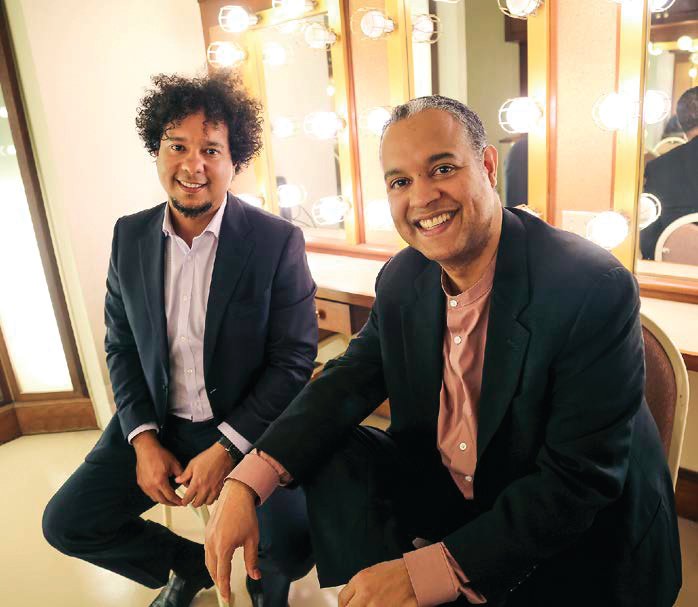Producer-director Ken Schneider has one simple thought about relations between America and Cuba.
“When politicians fail, culture succeeds,” Schneider said.
And his most …
This item is available in full to subscribers.
We have recently launched a new and improved website. To continue reading, you will need to either log into your subscriber account, or purchase a new subscription.
If you had an active account on our previous website, then you have an account here. Simply reset your password to regain access to your account.
If you did not have an account on our previous website, but are a current print subscriber, click here to set up your website account.
Otherwise, click here to view your options for subscribing.
* Having trouble? Call our circulation department at 360-385-2900, or email our support.
Please log in to continue |
|

Producer-director Ken Schneider has one simple thought about relations between America and Cuba.
“When politicians fail, culture succeeds,” Schneider said.
And his most recent documentary film — “Los Hermanos/The Brothers” — is a good example of that.
The film takes viewers on a musical tour in the U.S. that centers on the relationship between two brothers, Ilmar and Aldo Lopez-Gavilan. The brothers were born in Cuba in 1970 and are virtuoso Afro-Cuban musicians. At 14, Ilmar was sent to the USSR to study violin. He never lived in Cuba again, ultimately landing as a chamber violinist in the U.S.
Younger brother Aldo grew up mentored by Cuba’s impressive jazz and classic pianists and achieved renown status in Cuba, although the embargo with the U.S. kept him from performing in the United States.
Ilmar has traveled back to Cuba to see family, but the two brothers never have the time to collaborate musically. That was until Aldo was able to come to the U.S. in 2016, following the Obama Administration’s restoration of relations with Cuba in 2014.
But just how did the brothers’ relationship come to be a documentary?
Enter PatchWork Films.
“My first trip to Cuba was in 2014 for the Havana Film Festival,” Schneider said. “A friend there asked me to go to the Havana Jazz Festival with him to see this guy, who he said was ‘amazing’, play piano.
“I went and I was blown away,” he said.
Schneider was introduced to that young man, Aldo Lopez-Gavilan, and to his family. He came home and told his wife and partner in their film company, Marcia Jarmel, that they should make a film about him.
“She asked me ‘What’s the story?’
“And she was right. But soon afterward we learned he had a brother Aldo living in New York who was also a musician,” he recalled.
The couple got in touch with Aldo and met him in New York for brunch. It was then that they learned that Ilmar was coming to the U.S. to tour with Aldo’s quartet. Schneider knew they had their storyline.
“It was hard for me to imagine that the two brothers had never played together,” he said. “When Aldo went home to Cuba it was always for family things and they didn’t have the time to collaborate because collaboration with classical music takes time.”
Schneider and Jarmel spent 18 months following the brothers as they performed in New England, Chautauqua, New York, Detroit, Seattle, Las Vegas, and Florida. They filmed the brothers as they learned when to enter into the song and how to play off each other.
“I saw how we benefit from serious musicians being dedicated to every note,” Schneider said. “This music is part classical, part Cuban classic, and no other music sounds like it.”
The film also includes scenes from travels in Cuba with the brothers. Schneider has traveled to Cuba at least 15 times.
This is PatchWork’s second full-length documentary shot in Cuba and they’ve produced two short films there, too.
For “Los Hermanos/The Brothers,” the film took about four years to make.
Schneider and Jamel have more than 20 years’ experience in film-making. They have six award-winning films to their credit and their films have been broadcast worldwide and screened at festivals, schools, and community venues.
From his trips to Cuba, Schneider has seen that while Cuba lacks infrastructure and America is strong in that, Cuba is strong in sports, arts, dance, and music and seems to place those things higher on the priority list than America does.
“The embargo was harmful to Cuba,” he said. “They suffered from it. There’s no easy way around that. Cuba is America on its head.”
Schneider thought he would be a teacher with his English degree. But the summer after college he was offered an opportunity to help make a documentary with an acquaintance. That summer he helped view and edit 85 hours of film footage.
“I was smitten after that,” he said. “I knew I wanted in.”
He and Jarmel are pleased with the way the film came out.
“It’s a story of a beautiful relationship with family and a beautiful relationship with music,” he said. “This is a peak for me.”
They are dedicated to outreach and engagement for the film. He said there’s been much “chatter” about the fact that in the classical music world, everyone — the conductor, the musicians, the audience — are white.
“We wanted to make a film that allows Latinx and minorities see themselves in it,” he said. “We began this early on in the process. We were thinking about how to make a film that had legs in the world.”
They have been working with El Sistema USA and Sphinx in Detroit to reach out to those of Cuban and Latin descent.
“Outreach is where story-telling meets activism,” he said.
The film is part of the Port Townsend Film Festival. Schneider suggests looking at the website PatchWorksfilms.net to preview the music in the film.